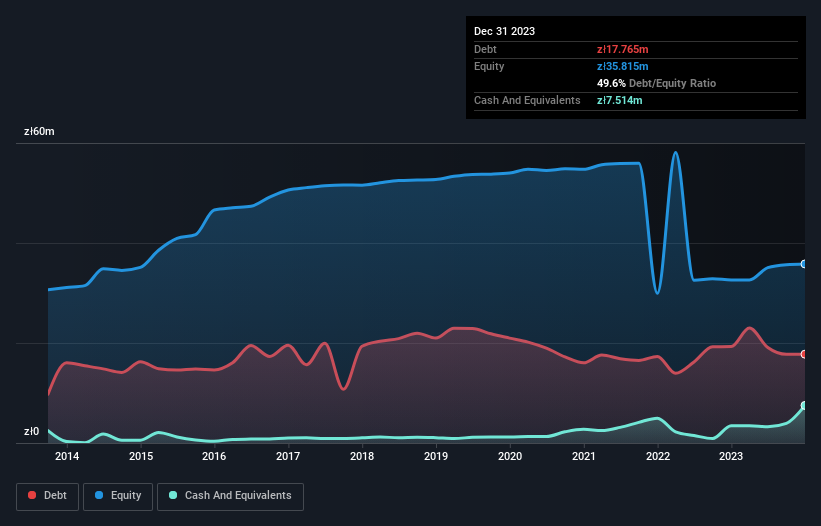The external fund manager backed by Berkshire Hathaway's Charlie Munger, Li Lu, makes no bones about it when he says 'The biggest investment risk is not the volatility of prices, but whether you will suffer a permanent loss of capital.' It's only natural to consider a company's balance sheet when you examine how risky it is, since debt is often involved when a business collapses. We can see that Biogened S.A. (WSE:BGD) does use debt in its business. But the more important question is: how much risk is that debt creating?
When Is Debt A Problem?
Debt and other liabilities become risky for a business when it cannot easily fulfill those obligations, either with free cash flow or by raising capital at an attractive price. If things get really bad, the lenders can take control of the business. However, a more frequent (but still costly) occurrence is where a company must issue shares at bargain-basement prices, permanently diluting shareholders, just to shore up its balance sheet. Of course, plenty of companies use debt to fund growth, without any negative consequences. The first thing to do when considering how much debt a business uses is to look at its cash and debt together.
View our latest analysis for Biogened
What Is Biogened's Debt?
The image below, which you can click on for greater detail, shows that Biogened had debt of zł17.8m at the end of December 2023, a reduction from zł19.3m over a year. However, it also had zł7.51m in cash, and so its net debt is zł10.3m.

A Look At Biogened's Liabilities
According to the last reported balance sheet, Biogened had liabilities of zł30.8m due within 12 months, and liabilities of zł10.3m due beyond 12 months. Offsetting these obligations, it had cash of zł7.51m as well as receivables valued at zł15.1m due within 12 months. So it has liabilities totalling zł18.4m more than its cash and near-term receivables, combined.
This deficit isn't so bad because Biogened is worth zł56.0m, and thus could probably raise enough capital to shore up its balance sheet, if the need arose. But it's clear that we should definitely closely examine whether it can manage its debt without dilution.
In order to size up a company's debt relative to its earnings, we calculate its net debt divided by its earnings before interest, tax, depreciation, and amortization (EBITDA) and its earnings before interest and tax (EBIT) divided by its interest expense (its interest cover). This way, we consider both the absolute quantum of the debt, as well as the interest rates paid on it.
While Biogened's low debt to EBITDA ratio of 0.89 suggests only modest use of debt, the fact that EBIT only covered the interest expense by 3.7 times last year does give us pause. So we'd recommend keeping a close eye on the impact financing costs are having on the business. Sadly, Biogened's EBIT actually dropped 5.3% in the last year. If that earnings trend continues then its debt load will grow heavy like the heart of a polar bear watching its sole cub. When analysing debt levels, the balance sheet is the obvious place to start. But you can't view debt in total isolation; since Biogened will need earnings to service that debt. So if you're keen to discover more about its earnings, it might be worth checking out this graph of its long term earnings trend.
Finally, a business needs free cash flow to pay off debt; accounting profits just don't cut it. So we always check how much of that EBIT is translated into free cash flow. Looking at the most recent three years, Biogened recorded free cash flow of 30% of its EBIT, which is weaker than we'd expect. That's not great, when it comes to paying down debt.
Our View
Neither Biogened's ability to cover its interest expense with its EBIT nor its EBIT growth rate gave us confidence in its ability to take on more debt. But it seems to be able handle its debt, based on its EBITDA, without much trouble. Looking at all the angles mentioned above, it does seem to us that Biogened is a somewhat risky investment as a result of its debt. That's not necessarily a bad thing, since leverage can boost returns on equity, but it is something to be aware of. The balance sheet is clearly the area to focus on when you are analysing debt. However, not all investment risk resides within the balance sheet - far from it. For example Biogened has 2 warning signs (and 1 which can't be ignored) we think you should know about.
At the end of the day, it's often better to focus on companies that are free from net debt. You can access our special list of such companies (all with a track record of profit growth). It's free.
Valuation is complex, but we're here to simplify it.
Discover if Biogened might be undervalued or overvalued with our detailed analysis, featuring fair value estimates, potential risks, dividends, insider trades, and its financial condition.
Access Free AnalysisHave feedback on this article? Concerned about the content? Get in touch with us directly. Alternatively, email editorial-team (at) simplywallst.com.
This article by Simply Wall St is general in nature. We provide commentary based on historical data and analyst forecasts only using an unbiased methodology and our articles are not intended to be financial advice. It does not constitute a recommendation to buy or sell any stock, and does not take account of your objectives, or your financial situation. We aim to bring you long-term focused analysis driven by fundamental data. Note that our analysis may not factor in the latest price-sensitive company announcements or qualitative material. Simply Wall St has no position in any stocks mentioned.
About WSE:BGD
Biogened
Develops, produces, and distributes pharmaceutical products in Poland.
Acceptable track record with mediocre balance sheet.
Market Insights
Community Narratives





